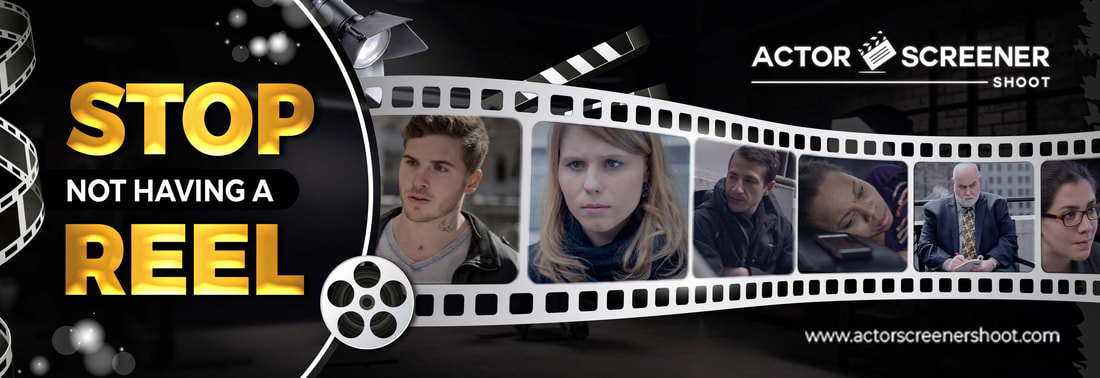|
By the end of this guide, you'll know exactly how to get a hardworking, legitimate talent agent as quickly as possible. Here's what we cover:
You don't want to "shotgun mail" your resume and materials to every agent out there. Doing that probably won't work, but even if it does, is that really the kind of agent you want? Someone who says yes to anyone? Agents like that are at worst scammers, and at best rarely get you access to good auditions. You'd be better off not having an agent at all. That's why you need to be strategic. Free Resource: Contact info of over 140 legit agencies across the world. How to Get an Acting Agent
|
|
Martin Bentsen (author of this guide) is an actor marketing coach who uses strategic thinking to help actors book more work. He’s helped over 14,000 actors with their careers and actor headshots since 2009 and his photography studio City Headshots is ranked #1 on Yelp. He’s spoken at NYU, The New England Theater Conference, The Actor’s Green Room, and other venues. Want to book more acting work by thinking strategically? Start with his free Actor’s Toolkit to create new opportunities right away, or visit his website at www.martinbentsen.com. |
Some Additional Q&A
What is the Difference Between a Manager and a Booking Agent?
A manager is someone whose typical role is to guide an actor and help them get their day to day work done so they can be more efficient and make it to more auditions.
Managers help actors by:
The biggest difference between agents and managers is that agents are licensed by the state to help you find employment opportunities and are usually not allowed to take more than a certain percentage of their client's earnings (10-15%, depending on where you're based). Managers are not licensed and can therefore take whatever percentage they want (some go as high as 30%).
Go into much more depth on this here: Agent vs. Manager: Which is Right for You?
Managers help actors by:
- Connecting them to the right people. Many managers have great contacts in the industry and can connect you to other experts such as acting coaches or headshot photographers. Some even help their clients find talent agents.
- Offering career guidance and mentorship. This is one of the primary roles of a manager – in fact, most managers only work with 20-30 actors so they can spend a lot more time with them (agents typically have a roster of 200-300 actors).
- Some managers will submit you for productions or negotiate deals for you, but that's technically not a manager's job. Some managers actually have access to Breakdown Services, but it's not very common.
The biggest difference between agents and managers is that agents are licensed by the state to help you find employment opportunities and are usually not allowed to take more than a certain percentage of their client's earnings (10-15%, depending on where you're based). Managers are not licensed and can therefore take whatever percentage they want (some go as high as 30%).
Go into much more depth on this here: Agent vs. Manager: Which is Right for You?
How Much Does it Cost to Get an Acting Agent?
Do you have to pay for an acting agent? Yes. No one will work for free, but agents charge a percentage of the revenue they generate for their clients. This means that if you find a job on your own, you won't need to pay your agent – but if they find a job for you, you have to pay them a certain percentage of whatever you earned from it.
Do talent agencies charge a fee? No. Neither agencies or agents should charge you a flat fee – if they do, run the other way because it's a scam! They are only allowed to take a percentage of the work they generate for you, so their cost will constantly be changing depending on how many jobs they help you book each month.
How much do acting agents cost? The typical percentage they take is 10-12%, but there are some agents who charge as high as 25-30%. In my opinion that's just way too much. I know some actors who have an agent who charges 30% AND a manager who charges 30%, leaving only 60% of revenue for the actor! That's not very good.
Do talent agencies charge a fee? No. Neither agencies or agents should charge you a flat fee – if they do, run the other way because it's a scam! They are only allowed to take a percentage of the work they generate for you, so their cost will constantly be changing depending on how many jobs they help you book each month.
How much do acting agents cost? The typical percentage they take is 10-12%, but there are some agents who charge as high as 25-30%. In my opinion that's just way too much. I know some actors who have an agent who charges 30% AND a manager who charges 30%, leaving only 60% of revenue for the actor! That's not very good.
Should I Get an Agent for Acting?
There are actors out there who book tons of work and don't have agents, but that's somewhat uncommon. To do that, you need to be spending just as much time on your marketing and networking efforts as you do on your acting and training! This is why most actors get agents – so they can focus more of their time on acting and less of their time building relationships in the industry.
To know whether you're ready for an agent, you should ask yourself the following questions:
If you've answered yes to at least 4 of the questions above (including both ABSOLUTE MUSTS), you should start the hunt for a great agent as soon as possible, because you're not getting any younger. Chances are you'll be able to sign with someone in just a few months!
If you didn't answer yes to 4 questions above, you can try getting an agent, but chances are you'll have a very hard time and it might take you a year or two. But that's totally OK! You can use the time to continue improving your craft and networking (while still self-submitting). You might even be able to find a manager who can give you some personalized guidance to help you start booking more work.
To know whether you're ready for an agent, you should ask yourself the following questions:
- ABSOLUTE MUST: Do you have plenty of availability for last-minute auditions? If you've got a job that prevents you from making it to auditions, most agents won't want to bring you on because a lot of the work in this industry comes up last-minute and you need to be available at a moment's notice.
- ABSOLUTE MUST: Am I talented and good at auditioning? This is a critical question because no agent will hire an actor whose acting is unrealistic or who is no good at auditioning. If you have trouble memorizing lines, or your acting seems melodramatic, or you get way too nervous whenever you go to auditions, you should get more training and work through those issues first. A simple way to know whether you're talented and good at auditioning is to look at your booking rate. If you're booking about 1 out of every 7 auditions you attend (about 14% or more), it means you're talented enough for an agent (this number applies even if the auditions you've been going on are just for unpaid student projects).
-
Are your basic marketing materials professional and up to date? Professional marketing materials are critical to being taken seriously in this industry. You definitely need a headshot, some footage showing your acting ability, and a professionally-formatted resume. A social media presence and website are not critical to getting an agent, but can help.
- Headshot: You should have a great, professional headshot that looks like you and was taken in the past two years. It should be in color and not be overly retouched.
- Footage: Having decent footage of yourself performing is important, but unless you're looking for a high-level agent, it's not critical to have high-budget footage of yourself. You can consider hiring a company like Actor Screener Shoot to shoot footage for your reel if you need to update it, otherwise simply recording some self-tape clips is often good enough.
- Resume: You need a professionally-formatted resume, and even if you don't have too many credits yet, it's OK, especially if you're young (more on that below).
- Are you still in school (this includes college)? Being young tells agents that you probably won't have much on your resume yet, meaning it will be easier to get an agent. There is a limited supply of young actors and agents are always looking for new ones to add to their roster. The younger you are, the better chance you have at getting a talent agent.
- Have you trained with any well-known names in the industry? If you're not sure, simply google your teachers' or coaches' names and see how many articles show up featuring them. If their name is all over the internet on lots of different websites, you can use their name recognition to improve an agent's interest in meeting with you by mentioning their name in your cover letter.
- Are you friends with anyone deeply established in the industry? If you know a casting director well or you have a manager with lots of connections, it becomes easier to get an agent because most agents are looking for actors who already know people (this means the agent's job of pitching you becomes easier).
- Are you in the union? Being in AEA or SAG-AFTRA can improve your chances of getting an agent because it shows them that you're established and take your work seriously. They'll be able to submit you for more productions as well, which is a big plus.
If you've answered yes to at least 4 of the questions above (including both ABSOLUTE MUSTS), you should start the hunt for a great agent as soon as possible, because you're not getting any younger. Chances are you'll be able to sign with someone in just a few months!
If you didn't answer yes to 4 questions above, you can try getting an agent, but chances are you'll have a very hard time and it might take you a year or two. But that's totally OK! You can use the time to continue improving your craft and networking (while still self-submitting). You might even be able to find a manager who can give you some personalized guidance to help you start booking more work.
Is it Hard to Get an Acting Agent?
It can feel very hard to get a talent agent when you're first starting out, especially if you're not strategic about it.
Most advice online tells you to mass mail your headshot, resume, and reel to 20-30 agents and hope to get a response, but there are a few simple strategies you can use to vastly improve your chances of getting called in for a meeting. We'll discuss these strategies further down in this article.
You should also be aware that there are different tier agents in the industry. Lower-tier agents can be much easier to sign with than top-tier agents because top-tier agents are so busy working with their current clients that they are very discerning about who to bring on. It can take years to get signed by a top-tier agent (even if you have a strong resume and lots of experience).
It's most difficult to get an agent when you're between the age of 22 and 30 because so many actors are around that age. If you don't have anything visually that sets you apart from other actors who look like you, most agents will likely already have someone just like you on their roster (meaning they won't be able to sign you without creating a conflict of interest).
Related: How to Find Your Brand as an Actor
Most advice online tells you to mass mail your headshot, resume, and reel to 20-30 agents and hope to get a response, but there are a few simple strategies you can use to vastly improve your chances of getting called in for a meeting. We'll discuss these strategies further down in this article.
You should also be aware that there are different tier agents in the industry. Lower-tier agents can be much easier to sign with than top-tier agents because top-tier agents are so busy working with their current clients that they are very discerning about who to bring on. It can take years to get signed by a top-tier agent (even if you have a strong resume and lots of experience).
It's most difficult to get an agent when you're between the age of 22 and 30 because so many actors are around that age. If you don't have anything visually that sets you apart from other actors who look like you, most agents will likely already have someone just like you on their roster (meaning they won't be able to sign you without creating a conflict of interest).
Related: How to Find Your Brand as an Actor
What is the Best Agency for Acting?
What is the biggest talent agency in Hollywood? As of 2021, William Morris Endeavor is widely considered to be the top acting agency. That being said, it's not necessarily the best agency for acting because A) it only signs well-known actors who have an extensive resume and B) even if you did get signed, they most likely wouldn't have the same time and attention to devote to you (an up-and-coming actor) as they would for their more established clients.
There are tons of acting agencies out there and you need to research their client roster (just search them using IMDB Pro) to find out whether you'd be a good fit. More on this soon.
What are the Big 4 talent agencies? The Big 4 are considered to be William Morris Endeavor, Creative Artists Agency, United Talent Agency, and ICM Partners.
There are tons of acting agencies out there and you need to research their client roster (just search them using IMDB Pro) to find out whether you'd be a good fit. More on this soon.
What are the Big 4 talent agencies? The Big 4 are considered to be William Morris Endeavor, Creative Artists Agency, United Talent Agency, and ICM Partners.
How Many Talent Agents Can You Have?
Technically you can have as many agents as you want, as long as they don't conflict with one another. Examples of non-conflicting agents are having a commercial agent and a legit agent, or have a Los Angeles agent and a New York agent (as long as neither represents the other region).
Most agents require you to sign a contract with them (unless you're freelancing) and the contract will stipulate whether you can have other agents in addition to the one you're signing with.
Freelancing means you can test-drive an agent and see how they are before actually signing a contract. They'll send you on auditions and you'll pay them their fee, but there is no written agreement. Signed, on the other hand means exactly that – you've signed a contract with them for a specified length of time.
Most agents require you to sign a contract with them (unless you're freelancing) and the contract will stipulate whether you can have other agents in addition to the one you're signing with.
Freelancing means you can test-drive an agent and see how they are before actually signing a contract. They'll send you on auditions and you'll pay them their fee, but there is no written agreement. Signed, on the other hand means exactly that – you've signed a contract with them for a specified length of time.
Should I Get a Manager or Agent First?
Most people will tell you to get a manager first, but the real answer depends on your personality.
A manager will help you get organized and do what you need to start booking more acting work. An agent will submit you for bigger auditions.
If you can manage yourself effectively, you might not need a manager. You can save your money and spend your time networking with people in the industry and organizing your own career. Many actors take courses like The Practical Performer to learn how to market themselves and save themselves money on a manager. They start with an agent first and then when they're eventually so busy with acting work that they can't manage their schedule, they eventually bring on a manager.
On the other hand, some actors hate dealing with the day to day work of networking and figuring out what to do next, and so are happy to get a manager first. Then their manager will eventually help them get an agent to start being submitted for bigger roles.
A manager will help you get organized and do what you need to start booking more acting work. An agent will submit you for bigger auditions.
If you can manage yourself effectively, you might not need a manager. You can save your money and spend your time networking with people in the industry and organizing your own career. Many actors take courses like The Practical Performer to learn how to market themselves and save themselves money on a manager. They start with an agent first and then when they're eventually so busy with acting work that they can't manage their schedule, they eventually bring on a manager.
On the other hand, some actors hate dealing with the day to day work of networking and figuring out what to do next, and so are happy to get a manager first. Then their manager will eventually help them get an agent to start being submitted for bigger roles.
What is a Legit Agent? What is a Commercial Agent?
A legit agent refers to an agent who submits you for professional film, TV, and theater productions. A commercial agent submits you for commercials – whether they're on TV, the internet, radio, etc.
Commercial agents are typically much easier to sign with because they're always looking for new talent. There are so many commercial agents looking for actors every month simply because of how many commercials shoot! Legit agents are much more discerning with who they sign because they need cream of the crop to submit for primetime television shows and major Hollywood films.
Commercial agents are typically much easier to sign with because they're always looking for new talent. There are so many commercial agents looking for actors every month simply because of how many commercials shoot! Legit agents are much more discerning with who they sign because they need cream of the crop to submit for primetime television shows and major Hollywood films.
How Do You Get an Agent for Acting With No Experience?
The best way to get a talent agent without any experience is by being young. As we discussed in a previous section called "Should I Get an Agent for Acting?" the younger you are, the more likely you are to get an agent without professional experience. However, the longer it's been since you've finished school, the more difficult it will be and the more an agent will wonder why your resume has no credits on it.
The only other way to get an acting agent with zero experience is to focus on getting a commercial agent first. There are many commercial agents looking for actors who are new to the industry, and having a thin resume won't hurt your chances with them. As long as you're good at acting and have availability for last-minute auditions, it should be fairly easy to get a commercial agent. You can then try asking your commercial agent for introductions to legit agents (only after you've worked together for a few months, and assuming you've booked work and done a good job).
The only other way to get an acting agent with zero experience is to focus on getting a commercial agent first. There are many commercial agents looking for actors who are new to the industry, and having a thin resume won't hurt your chances with them. As long as you're good at acting and have availability for last-minute auditions, it should be fairly easy to get a commercial agent. You can then try asking your commercial agent for introductions to legit agents (only after you've worked together for a few months, and assuming you've booked work and done a good job).
Further Reading:
If you enjoyed this article, I have a feeling you'll enjoy the following links:
Comments are closed.





